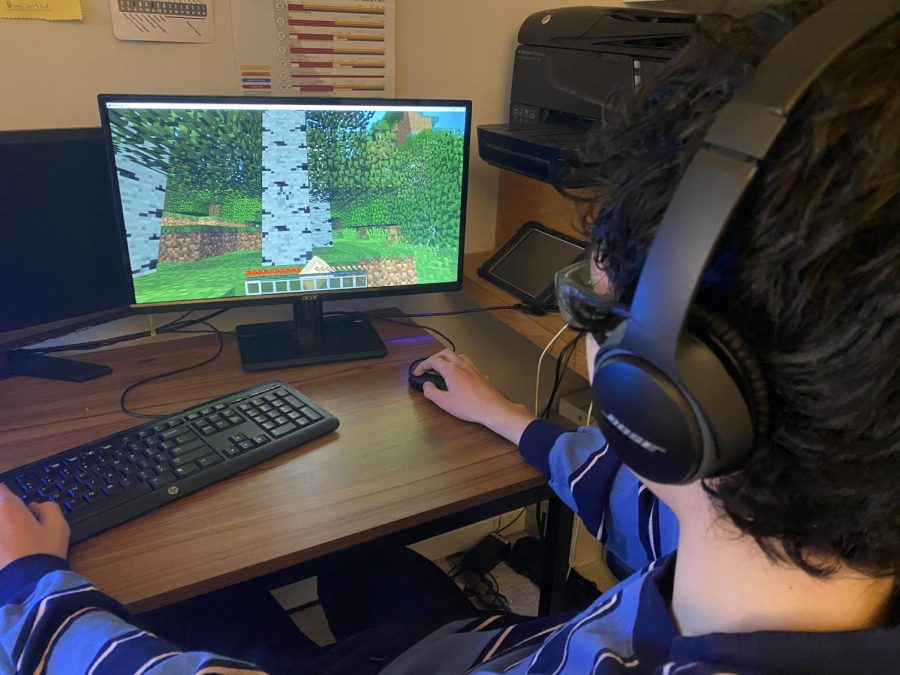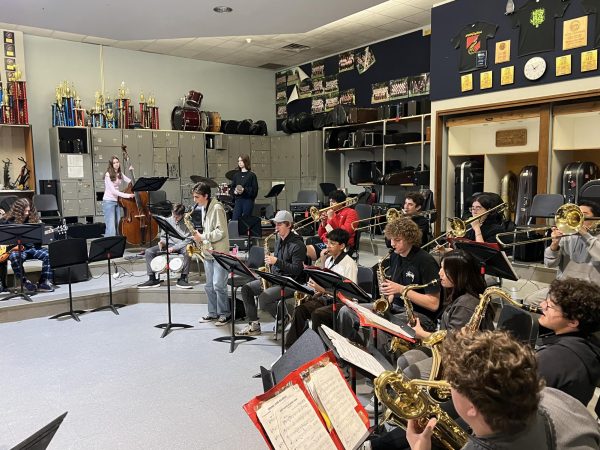Video gaming in the pandemic – Boredom killer or psychological damager?
Freshman Sean Donelan enjoys a popular video game called Minecraft in January.
The pandemic halted outdoor fun for many students and adults but hasn’t brought an end to all fun. Video games have brought people together in lieu of physical interaction, but do these video games come with a mental cost?
According to Statista’s (an enterprise market research firm) research, video game usage has increased 46% in the United States since March 2020 when people were forced from schools and jobs to their homes over pandemic concerns. Other countries have followed suit with the rise in video games, like France (41% growth), the U.K. (28%), and Germany (21%). Statistically, about half of every citizen living in America now plays video games weekly.
Ever since the creation of violent video games, there have been parents and some health advisors propagating the idea that they cause violent behavior in the players of these games. Do these games really invoke violent behavior in those who play them? Or are they a benevolent way of bringing students and adults together?
Junior Nate Elwood thinks that “…video games can definitely affect behavior, a lot of it positively; as a stress reliever, boredom killer, and can help with things like spatial awareness and multitasking. Violent video games in particular though, it really depends on how someone is raised and how they were introduced to that specific game.”
What does science have to say? In his 2009 study on the correlation between video games and aggressive behavior, Christopher Bartlett of the Gettysburg College in Pennsylvania reports, “adults feel more hostile after playing violent games–especially games that simulate real-life situations.”
However, many studies and reports state that long-term effects are negligible. According to psychology researcher Christopher Ferguson of Florida’s Stetson University, who reported his findings in 2011, “our studies, or more of lack of studies, have shown that children do not experience any long-term behavior changes.” Researchers have also observed that violent people play more violent video games than less violent people, but have concluded that the violent people tested were not violent because of violent video games.
Video games, violent or not, are helping students take their minds off of the stress of school and the claustrophobia of quarantining. Senior Almeera Siddiqui reported that “…video games have become a very therapeutic outlet for me over the past eight months. Being able to play games right after college applications has been a fun way to channel my worries in an untraditional creative way.”
Others have similar positive experiences with video games, like freshman Gabriella Tapia, who said that “video games bring me a great deal of entertainment”
Freshman Meyer Stangl agrees. “Video games are a very nice way of killing the stress of school,” he said.
Although students love their video games, they do not agree on video games’ effects on behavior in the short or long term.
Siddiqui thinks that “the argument of whether video games cause violent behavior is rather ridiculous,” and “most people are able to separate what they see in a video game and how they should behave in their everyday life.
“Nobody is going to murder someone just because they played some video games,” Stangl said.
Elwood and Tapia disagree with Siddiqui. They both think that video games do affect long term behavior. Tapia says that, “Seeing how some character and/or things that you admire do certain actions [specifically violent actions] makes you want to do the same.”
It should be noted that there has been a shift in the public’s perception of video games. Before the coronavirus and the beginning of the widespread adoption of video games as replacements for real social interaction, many looked down on video games as an addictive agent that isolates a person from the real world.
Now that you know what science and a few students think, can you form an opinion? Leave a comment down below along with your school email address if you’d like to contribute.










